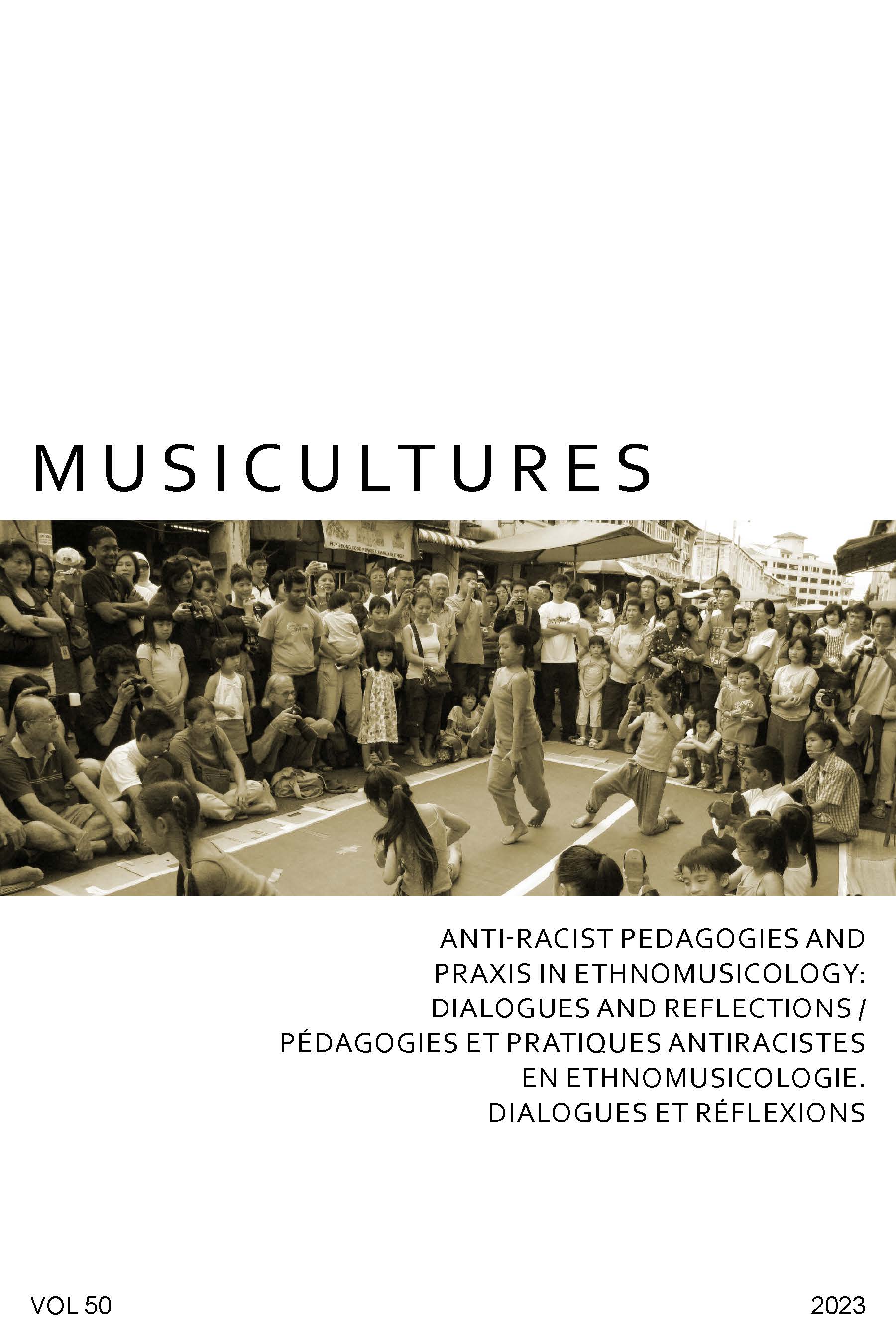Abstract
This article explores some of the specific dynamics and processes experienced by Canadian old-time fiddlers as they learn to fiddle in a community of practice (CoP). Based on an analysis of interviews with several fiddlers at the Kenosee Lake Kitchen Party fiddling camp, we explore two elements of fiddling that the fiddlers identified as crucial to the development of expertise as an old-time fiddler: a danceable quality and personalizing a tune. Danceability allowed for historical continuity of the community’s practices, while making a tune your own provided a way to introduce new ideas and practices into the CoP, resulting in growth and change.
References
Canadian Grand Masters Fiddling Association. 2019. http://cgmfa-acgmv.ca/.
Doherty, Elizabeth Anne. 1996. The Paradox of the Periphery: Evolution of the Cape Breton Fiddle Tradition c1928-1995. PhD dissertation, University of Limerick.
Ellis, Julia L. 1998. The Teacher as Interpretive Inquirer. In Teaching from Understanding: Teacher as Interpretive Inquirer, 1–14. Ed. Julia L. Ellis. New York: Garland.
Fuoco, Kristi Weiss. 2007. Métis Fiddling at the Borders of Canadian Tradition. MA thesis, University of British Columbia.
Forsyth, Meghan. 2011. Teaching “Trad”: A Fiddling Ethnomusicologist’s Reflections on Fiddle Camp. Canadian Folk Music 45 (2): 1–7.
Garrison, Virginia Hope. 1985. Traditional and Non-Traditional Teaching and Learning Practices in Folk Music: An Ethnographic Field Study of Cape Breton Fiddling. PhD dissertation, University of Wisconsin-Madison.
Giroux, Monique. 2013. Music, Power, and Relations: Fiddling as a Meeting Place Between Re-Settlers and Indigenous Nations in Manitoba. PhD dissertation, York University.
Johnson, Sherry Anne. 2006. Negotiating Tradition in Ontario Fiddle Contests. PhD dissertation, York University.
Johnson, Sherry Anne. 2008. “I Don’t Want to Sound Like Just One Person”: Individuality in Competitive Fiddling (Excerpt). Elphinstone Institute.
Lave, Jean, and Etienne Wenger. 1991. Situated Learning: Legitimate Peripheral Participation. New York: Cambridge University Press.
Lederman, Anne, and Cristina Smith. 2014. Fiddling. The Canadian Encyclopedia. https://thecanadianencyclopedia.ca/en/article/fiddling-emc (accessed August 18, 2020).
Patterson, Michael E., and Daniel R. Williams. 2002. Collecting and Analyzing Qualitative Data: Hermeneutic Principles, Methods, and Case Examples. Champaign, IL: Sagemore Publishing.
Schippers, Huib. 2010. Facing the Music: Shaping Music Education from a Global Perspective. New York: Oxford University Press.
Schmidt-Jones, Catherine. 2013. The Basic Elements of Music. Textbook equity ed. https://textbookequity.org/Textbooks/TBQ_the-basic-elements-of-music.pdf (accessed October 11, 2023).
Schön, Donald A. 1983. The Reflective Practitioner: How Professionals Think in Action. New York: Basic Books.
Smith, David G. 1991. Hermeneutic Inquiry: The Hermeneutic Imagination and the Pedagogical Text. In Forms of Curriculum Inquiry, 187–209. Ed. Edmund C. Short. Albany: SUNY Press.
Veblen, Kari. 1991. Perceptions of Change and Stability in the Transmission of Irish Traditional Music: An Examination of the Music Teacher’s Role. PhD dissertation, University of Wisconsin-Madison.
Wenger, Etienne. 1998. Communities of Practice: Learning, Meaning, and Identity. Cambridge: Cambridge University Press.
Wenger, Etienne. 2000. Communities of Practice and Social Learning Systems. Organization 7 (2): 225–46.
Wenger, Etienne, Richard McDermott, and William M. Snyder 2002. Cultivating Communities of Practice: A Guide to Managing Knowledge. Boston: Harvard Business School Press.
Wenger-Trayner, Etienne, Mark Fenton-O’Creevy, Steven Hutchinson, Chris Kubiak, and Beverly Wenger-Trayner. 2015. Learning in Landscapes of Practice. New York: Routledge.
- The author retains copyright over the work.
- The author grants the journal owner (The Canadian Society for Traditional Music / La Société canadienne pour les traditions musicales) an exclusive license to publish the work.
- The author may post a pre-print or post-print version of the work (see definitions below) on a personal website for up to twelve months after the work is published in MUSICultures. After twelve months, the pre-print version must be replaced with the published version.
- The author may deposit the published PDF of the work in a non-commercial online repository twelve months after the work is published in MUSICultures, or any time thereafter.
- Any such deposit must include a link to the work on the MUSICultures website, e.g., https://journals.lib.unb.ca/index.php/MC/article/view/19996
A pre-print is a work-in-progress—a contribution not yet accepted, or perhaps even submitted, to MUSICultures.
A post-print is the version of a contribution after peer review and acceptance by MUSICultures, with revisions completed.
The published version is the PDF file of a contribution as it appears in MUSICultures.
Please note that academia.edu and ResearchGate.com are both for-profit repositories; authors may not deposit the published PDF of the work in these repositories until after the journal’s embargo period.
For permission to reprint or translate material from MUSICultures, please contact Heather Sparling, General Editor of MUSICultures (heather_sparling@cbu.ca).

